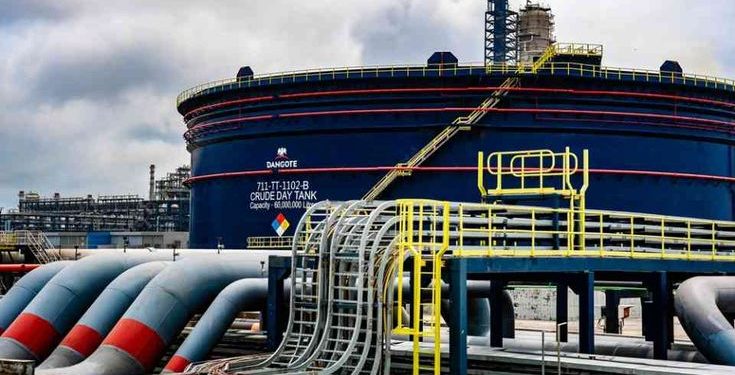The management of Dangote Group has averted what could have spiraled into a prolonged nationwide crisis in the oil and gas industry by offering to allow unionisation of its refinery and petrochemical employees. This offer led the Nigeria Union of Petroleum and Natural Gas Workers (NUPENG) to suspend its planned two-day strike, which had threatened fuel supply across the country.
The breakthrough was sealed at a high-level mediation meeting in Abuja on Tuesday, bringing together labour leaders, government officials, and representatives of Africa’s largest conglomerate.
The Offer That Changed the Tide
For months, tension had been brewing between NUPENG and the Dangote Group over allegations that workers in the multi-billion-dollar Dangote Refinery and associated petrochemical facilities were being denied the right to freely join trade unions. NUPENG, backed by the Nigeria Labour Congress (NLC) and the Trade Union Congress (TUC), maintained that the company was flouting Nigeria’s labour laws, which guarantee workers’ freedom of association.
Faced with the possibility of a major disruption in petroleum distribution and mounting pressure from security and government authorities, Dangote Group formally offered to recognise the rights of employees to join unions of their choice.
Under the terms of the Memorandum of Understanding (MoU) signed on Tuesday:
- Unionisation recognised as a right: Dangote pledged that all refinery and petrochemical staff who wish to unionise would be allowed to do so without obstruction.
- Two-week timeframe: The unionisation process will commence immediately and must be concluded between September 9 and September 22, 2025.
- Non-victimisation guarantee: No employee will be dismissed, punished, or discriminated against for participating in the strike or for choosing to join a union.
- No alternative unions: Both parties agreed that no parallel or company-controlled unions will be set up to undermine workers’ freedom of association.
- Follow-up accountability: Parties will reconvene with the Minister of Labour one week after the unionisation process is concluded to provide a compliance report.
Mediation and High-Level Involvement
The truce was brokered at the Department of State Services (DSS) headquarters in Abuja. Security agencies became involved after fears that a prolonged strike could destabilise fuel supply and aggravate the country’s fragile energy market.
Those present at the meeting included:
- Government representatives: Minister of Finance Wale Edun; Minister of Labour Muhammad Maigari Dingyadi; Minister of State for Labour Nkeiruka Onyejeocha.
- Dangote Group delegation: Led by Group Managing Director, Sayyu Dantata, who represented the company’s commitment to abide by labour standards.
- Labour movement leaders: NUPENG President Akporeha Williams, General Secretary Afolabi Olawale, NLC Acting General Secretary Benson Upah, TUC Secretary-General Nuhu Toro, and representatives of the Nigerian Midstream and Downstream Petroleum Regulatory Authority (NMDPRA).
The involvement of these stakeholders signalled the seriousness of the issue, and the government’s determination to prevent an escalation that could paralyse the economy.
Strike Suspended, Relief for Nigerians
Following the signing of the MoU, NUPENG announced the suspension of its strike with immediate effect. Fuel distribution activities, which had slowed down during the standoff, resumed across depots and filling stations nationwide.
Union leaders described the agreement as a “victory for Nigerian workers,” insisting that it not only guarantees workers at the refinery their constitutional rights but also strengthens the broader labour movement in Nigeria’s oil and gas industry.
For Dangote Group, the agreement ends weeks of negative publicity and potential operational disruptions at its flagship refinery, which is seen as central to Nigeria’s quest for fuel self-sufficiency.
Implications for Nigeria’s Oil Sector
This development carries significant implications:
Labour Relations: It sets a precedent for enforcing union rights in private mega-projects, especially in sectors traditionally prone to industrial disputes.
Energy Security: By averting a prolonged strike, the deal helps stabilise petroleum supply, which had begun showing signs of disruption.
Investor Confidence: The swift resolution reassures both local and international stakeholders that disputes in Nigeria’s critical industries can be resolved through dialogue rather than prolonged confrontation.
Union Strength: The agreement reinforces NUPENG’s position as a key player in defending workers’ rights in Nigeria’s strategic oil sector.
With the strike suspended, attention now shifts to the practical implementation of the MoU. The coming two weeks will be critical as workers at the refinery begin the formal process of unionisation.
Labour leaders have vowed to closely monitor compliance, warning that any attempt to renege on the agreement could trigger renewed industrial action. The government, on its part, has promised to hold both parties accountable, underscoring the importance of industrial peace in a sector that powers Nigeria’s economy.
Summary Table
| Key Element | Detail |
|---|---|
| Dangote’s Offer | Recognition of workers’ right to unionise |
| Strike Outcome | NUPENG suspended its two-day strike |
| Unionisation Timeline | September 9–22, 2025 |
| Worker Safeguards | No victimisation; no parallel or employer-controlled unions |
| Mediating Parties | DSS, Ministries of Finance and Labour, NLC, TUC, NUPENG, Dangote Group |
| Follow-Up | Report back to Minister of Labour after completion of unionisation process |
























































